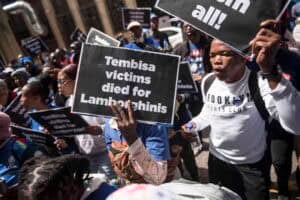Analysts say Ramaphoria has dissipated and it doesn’t look good for the ruling party.

Ramaphoria has worn off – and if the ANC’s electoral performance during recent by-elections in several provinces are anything to go by, the ruling party has to work harder if it wants to stem the tide against it.
Political analyst Daniel Silke said if this week’s by-election results in North West and Northern Cape and several others where ANC votes have dropped, are a tiny barometer of the sentiment toward the ANC, they should pull up their socks for 2019.
Silke said there has been less electoral enthusiasm for the ANC under President Cyril Ramaphosa, hence the party did not do well in Wednesday’s Northen Cape and North West by-election.
“There is no electoral miracle brought [about] by the Ramaphosa factor for the ANC,” he said.
According to the Independent Electoral Commission, both the ANC and the DA retained their 2016 local government seats in Wednesday’s by-elections in the North West and Northern Cape.
But the DA has increased its tally in Siyancuma Municipality, while newly elected ANC councillor Tshepo Confidence Khumalo won Ward 21 in Moses Kotane Municipality in North West.
He won with a reduced margin of 63.56% of the votes cast compared to 69.66% in the 2016 elections.
In Ward 4 in Siyancuma Municipality in the Northern Cape, the DA increased its victory margin to 50.63% compared to 43.82% in the 2016 municipal elections.
Wednesday’s voter turnout was 63.78%.
Silke said it was interesting that the arrival of the new ANC leaders led by Ramaphosa coincided with a spike in the ANC by-election performance since the beginning of this year.
“You would have thought that the feel-good factor that came with Ramaphosa would have translated into votes for the ANC, but so far it has not,” Silke said.
He said the ANC would be disappointed to learn that it was unable to capitalise on the new administration and the Ramaphosa factor.
Even the EFF showed an improvement in this particular by-election on Wednesday. Julius Malema’s party seemed to be gaining traction in North West after the party’s Bongani Patrick Cekiso took an ANC seat in Ward 15 at Ditsobotla municipality last April.
The ANC struggled to make electoral ends meet in other provinces too.
In seven by-elections held in April in Gauteng, North West and Western Cape, the DA retained five seats, with the ANC winning Ward 92 by-election in Johannesburg.
However, the ruling party managed to outdo the DA only in Ward 9 in Bela Bela Municipality in Limpopo, where the ANC’s Boetie Maname unseated a DA candidate with 48.16%.
Although the DA was defeated, the ANC failed to achieve the 49.09% that the DA received in the 2016 Municipal Elections.
Similarly, the ANC lost an attempt to wrest Ward 18 ANC from the DA in Buffalo City in the Eastern Cape. The DA retained the seat it had won in the 2016 municipal elections with an increased margin of 95.92% of the votes cast compared to 88.08%.
Silke said these underperformances by the ruling ANC pointed towards a failure of the expected Ramaphoria effect.
“There has not been any great enthusiasm for the ANC if these by-elections were to be used as a barometer. It doesn’t seem the end of Zuma has brought great enthusiasm for the ANC,” Silke said.
However, Silke said although erratic fluctuation on the ANC votes may occur countrywide, he wasn’t sure whether the ruling party would perform badly in the upcoming 2019 national election.
An electoral political analyst foreshadowed the recent electoral outcomes last month after the re-emergence of the IFP in former ANC strongholds in the province KwaZulu-Natal.
Consultant Dawie Scholtz said the Mthonjaneni by-election in rural KwaZulu-Natal on July 26 could be seen as “another data point indicating a swing away from the ANC in rural KZN”.
That result saw 52% of the voters supporting the IFP, representing an uptick of 5%, and a drop of 8% for the ANC.
Like Silke, Scholtz said this suggested bad news for the ruling party. The ANC received 62.15% of the vote in 2014 nationally.
For more news your way, download The Citizen’s app for iOS and Android.






